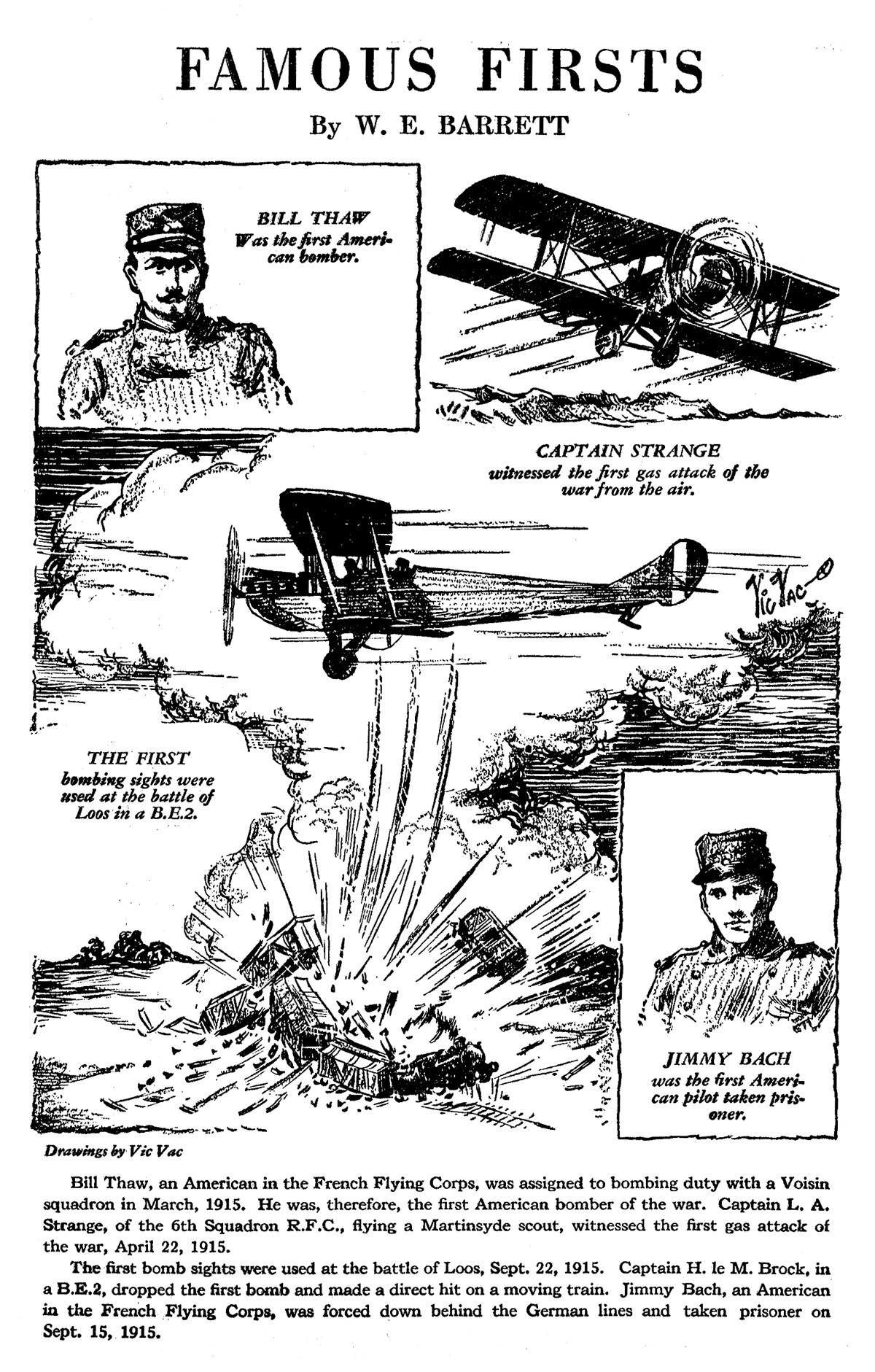William E. Barrett is one of our favorite authors. Before he became renown for such classics as The Left Hand of God and Lilies of The Field, Barrett honed his craft across the pages of the pulp magazines—writing all matter of stories from Mystery to Detective to Aviation and War. Here at Age of Aces Books he’s best known for his nine Iron Ace stories which ran in Sky Birds in the mid ’30s!
Sign In
Recently I picked up a couple of issues of Dime Detective Magazine from 1935—May 15th and October, both featuring William E. Barrett’s unconventional crime solver, tattoo artist Needle Mike. And both featuring great Walter Baumhofer covers! Pretty decent shape for their price aside from the fact someone had to write their name across the guy’s chest on the May issue.
As I looked at it, I was thinking it looked familiar. . .
It couldn’t be . . .
. . . but I think it is.
Matching it up with other examples I have . . .

it matches pretty well—I think it’s William E Barrett’s signature scrawled across the chinaman’s chest! I got me a surprise signed copy!
And Tell Us About Yourself
SINCE William E. Barrett’s birthday is on the 16th of this month, we’re celebrating Barrett all month long with one of his stories each of the next three Fridays. To lay a little ground work, here is an autobiography Barrett had in the first and only issue of the digest-sized Swift Story Magazine (It fits in your pocket!) from November 1930:
I VENTED my first squawk at life in  the City of New York on November 16, 1900. It was snowing like blazes that day, if I remember rightly. Anyway, 1 managed to survive the hazards of Manhattan boyhood until I was sixteen, then, while the native New Yorkers of my age were pouring in from Kansas, Missouri and Minnesota, I followed the family star of destiny to Colorado. I had prepared at Manhattan College Prep in New York for an engineering career, but this proved to be a misdeal and I took a whirl at reporting for a Denver daily. I never progressed past the cub stage and was fervently advised by a harassed city ed. that I never would. After that I became one of the young men who signed the coupon.
the City of New York on November 16, 1900. It was snowing like blazes that day, if I remember rightly. Anyway, 1 managed to survive the hazards of Manhattan boyhood until I was sixteen, then, while the native New Yorkers of my age were pouring in from Kansas, Missouri and Minnesota, I followed the family star of destiny to Colorado. I had prepared at Manhattan College Prep in New York for an engineering career, but this proved to be a misdeal and I took a whirl at reporting for a Denver daily. I never progressed past the cub stage and was fervently advised by a harassed city ed. that I never would. After that I became one of the young men who signed the coupon.
I took a correspondence course in engineering and went to work for a power company, continuing the engineering studies at night. After several years of misery at the drafting board an engineer, who took pride in his profession, intervened.
“Get thee into publicity work,†he said. “I’ll help you. Anything which reduces the quota of rotten engineers is a blessing, even if it adds to the ranks of the press agents.â€
A publicity job with a big electrical manufacturer took me all over the West—mining camps, oil towns and every place where spectacular installations were made.
But presently some base deceiver told me about the big pay and easy hours in fictioneering and I tried my hand. By the time I found out the horrible truth, I was too badly bitten by the bug ever to escape. I learned to fly with the idea of writing air stories that would be authentic, then took a publicity job with a large aircraft company for about a year. Derek Dane was evolved out of the experiences of that year which brought me in touch with many characters fully as picturesque in background as Dane—men to whom the dramatic is daily fare.
Not because Mr. Patten is the boss when I write for you, but because it is so, I want to acknowledge him as one of the biggest influences in my life—that before I even knew his name was Patten. His Merriwell stories dominated my youth, and nobody ever toiled harder to be like some one than I did to be like Frank Merriwell. Not at all athletic, nor inclined to “big†effort, I still managed to make four school letters struggling to be Merriwell. Many other decisions were Merriwell colored, too—and a career is only a series of effects from a multitude of small decisions. I have two trunks of Merriwells—every one published—and will have my boy read them some time.
My total published stuff, if any one cares, is 263 short stories, 10 complete novels, 18 novelettes and countless articles. In Derek Dane I am not trying to create a detective of the master-mind school. 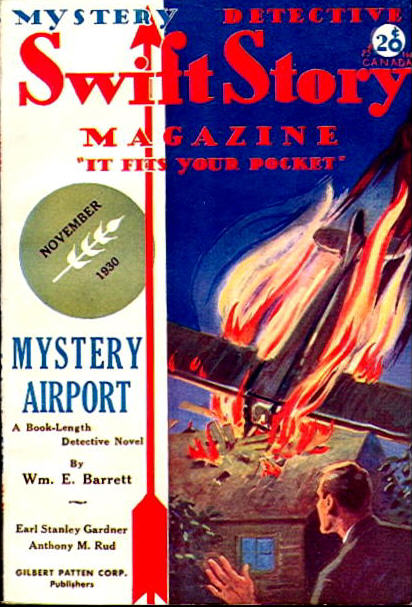 Great thinkers are not lions for courage—thought convinces them of the folly of risk. I am thinking of the men who brought the law to the wilderness in the first place (the same type who will bring it back when it strays). Most of them were men who sought escape from the law some place else— not sticklers for the fine points of the written law, but foursquare for a square deal and for the rights of human beings to live their lives and keep what they have. Derek Dane stands for that and, if he steps outside the statute book to get results, he has fundamental laws to justify him.
Great thinkers are not lions for courage—thought convinces them of the folly of risk. I am thinking of the men who brought the law to the wilderness in the first place (the same type who will bring it back when it strays). Most of them were men who sought escape from the law some place else— not sticklers for the fine points of the written law, but foursquare for a square deal and for the rights of human beings to live their lives and keep what they have. Derek Dane stands for that and, if he steps outside the statute book to get results, he has fundamental laws to justify him.
I hope that the readers of Swift Story Magazine will like Derek Dane, and I’ll give them my pledge that as they get to know him better with succeeding yarns they will find him developing an increasing ability to entertain them. He is too complex a character to put across in one story.
My wife made her first short story sale this week and we are in a celebrating mood. She has helped me with so many of mine that it is a big kick to see her push across a yarn of her own. I’ve got a boy and a girl—to round out the personal narrative—and I’m still in love. . . .
Sorry there isn’t more plot or drama or excitement in this—but if there was, this being a sordid age, I’d probably stick a name like Pete Jones on myself and sell the darn thing.
Hasta luego,







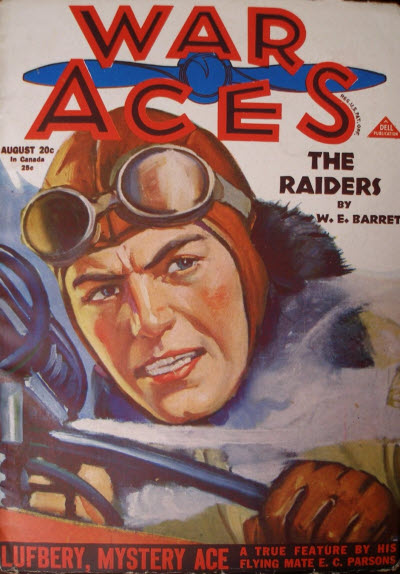 the greatest British offensive of the war got under way. A blazing line of steel whipped across France and into Belgium; from Croiselles to Loos, from Ypres to the Nieuport Canal and to the sea. Under the greatest artillery barrage in the history of the world a grim horde of muddy infantry hit the Hindenburg Line.
the greatest British offensive of the war got under way. A blazing line of steel whipped across France and into Belgium; from Croiselles to Loos, from Ypres to the Nieuport Canal and to the sea. Under the greatest artillery barrage in the history of the world a grim horde of muddy infantry hit the Hindenburg Line.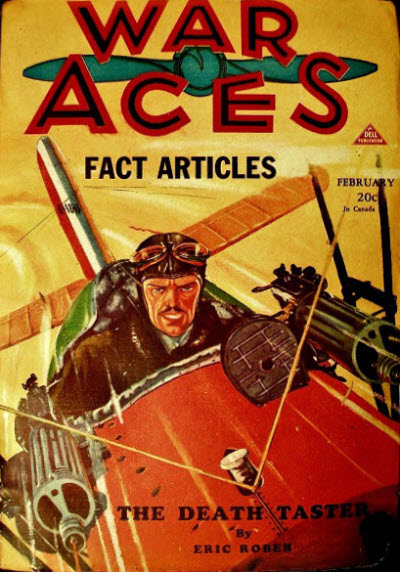 probably the only one of his kind in existence. Accidental aces there were aplenty in that big he war, but there was nothing accidental about Memphis Mason’s accomplishment. It was planned with an attention to detail that would do credit to a brigadier and it was attested by five of the finest fighters in the R.A.F. Those signatures are at the root of Mason’s secret sorrow to-day. At the foot of a square sheet of note-paper they bear flourishing witness to the fact that the signers witnessed the bringing down of five German planes by one Memphis Mason. Not one of those signers would have lied for anyone. They were officers and gentlemen and they saw what they said they saw. Yet, strangely enough, Memphis Mason never reached France. Therein lies a tale; one of the oddest tales to come out of the war and one that has never been told until this telling.
probably the only one of his kind in existence. Accidental aces there were aplenty in that big he war, but there was nothing accidental about Memphis Mason’s accomplishment. It was planned with an attention to detail that would do credit to a brigadier and it was attested by five of the finest fighters in the R.A.F. Those signatures are at the root of Mason’s secret sorrow to-day. At the foot of a square sheet of note-paper they bear flourishing witness to the fact that the signers witnessed the bringing down of five German planes by one Memphis Mason. Not one of those signers would have lied for anyone. They were officers and gentlemen and they saw what they said they saw. Yet, strangely enough, Memphis Mason never reached France. Therein lies a tale; one of the oddest tales to come out of the war and one that has never been told until this telling.
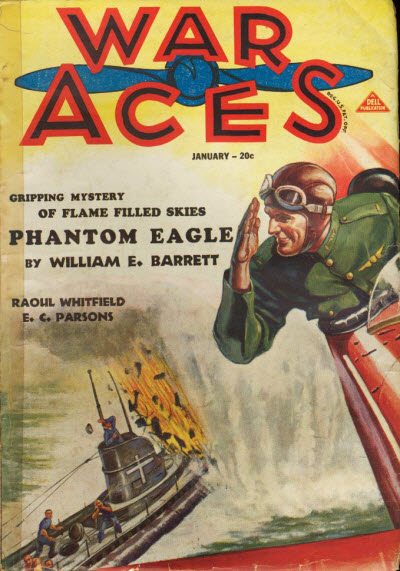 in the January 1932 War Aces—”Unless we misjudge the reading taste of our readers we feel that “Phantom Eagle,†by W. E. Barrett is about the ideal story. It has that balance of action, mystery and fantasy that gives you a new set of thrills. Obviously, it was too bizarre to be entirely fiction, so we asked the author about it. As is the case with most of Barrett’s fiction, it is based on some true incident. Here is his letter:
in the January 1932 War Aces—”Unless we misjudge the reading taste of our readers we feel that “Phantom Eagle,†by W. E. Barrett is about the ideal story. It has that balance of action, mystery and fantasy that gives you a new set of thrills. Obviously, it was too bizarre to be entirely fiction, so we asked the author about it. As is the case with most of Barrett’s fiction, it is based on some true incident. Here is his letter: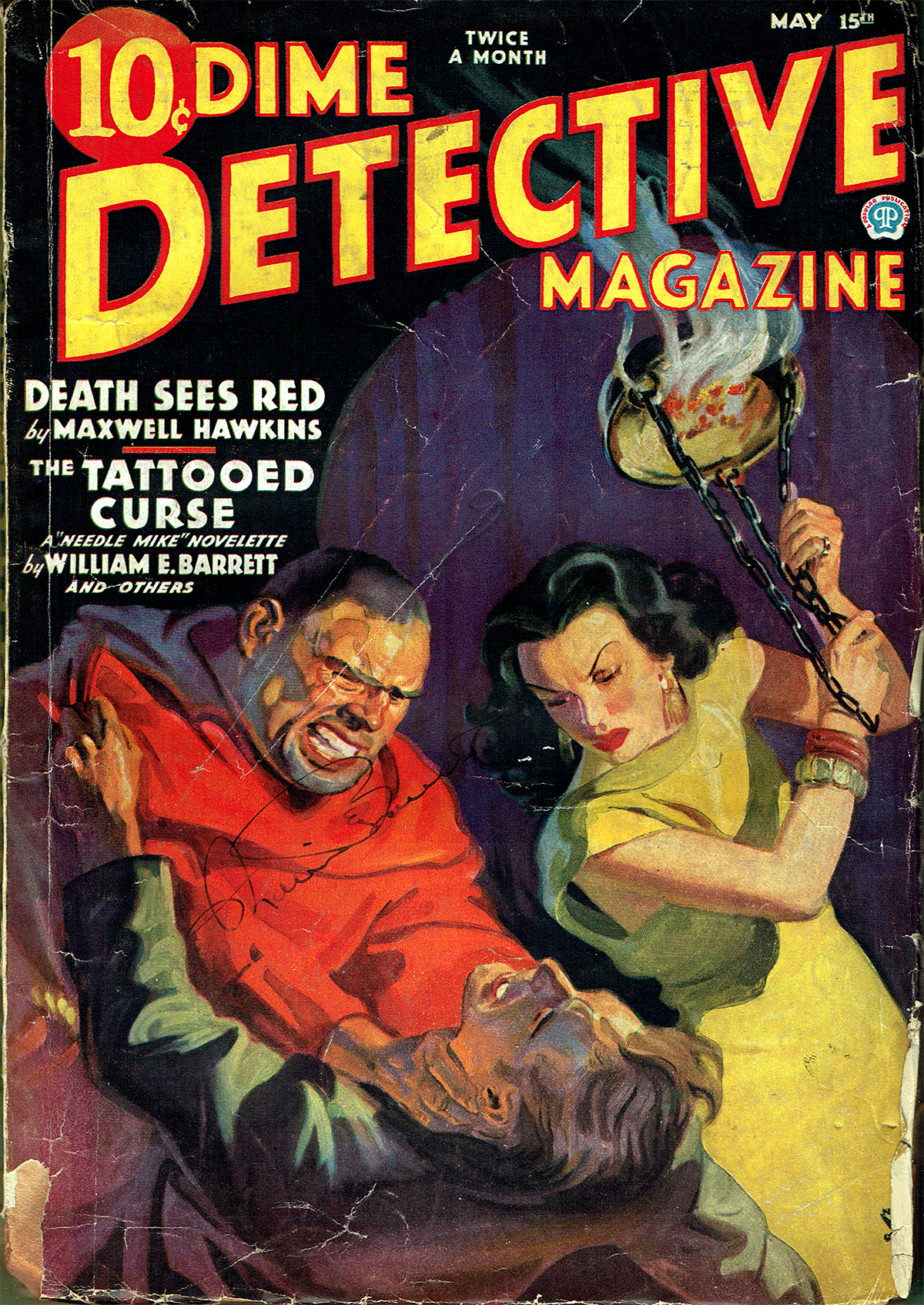
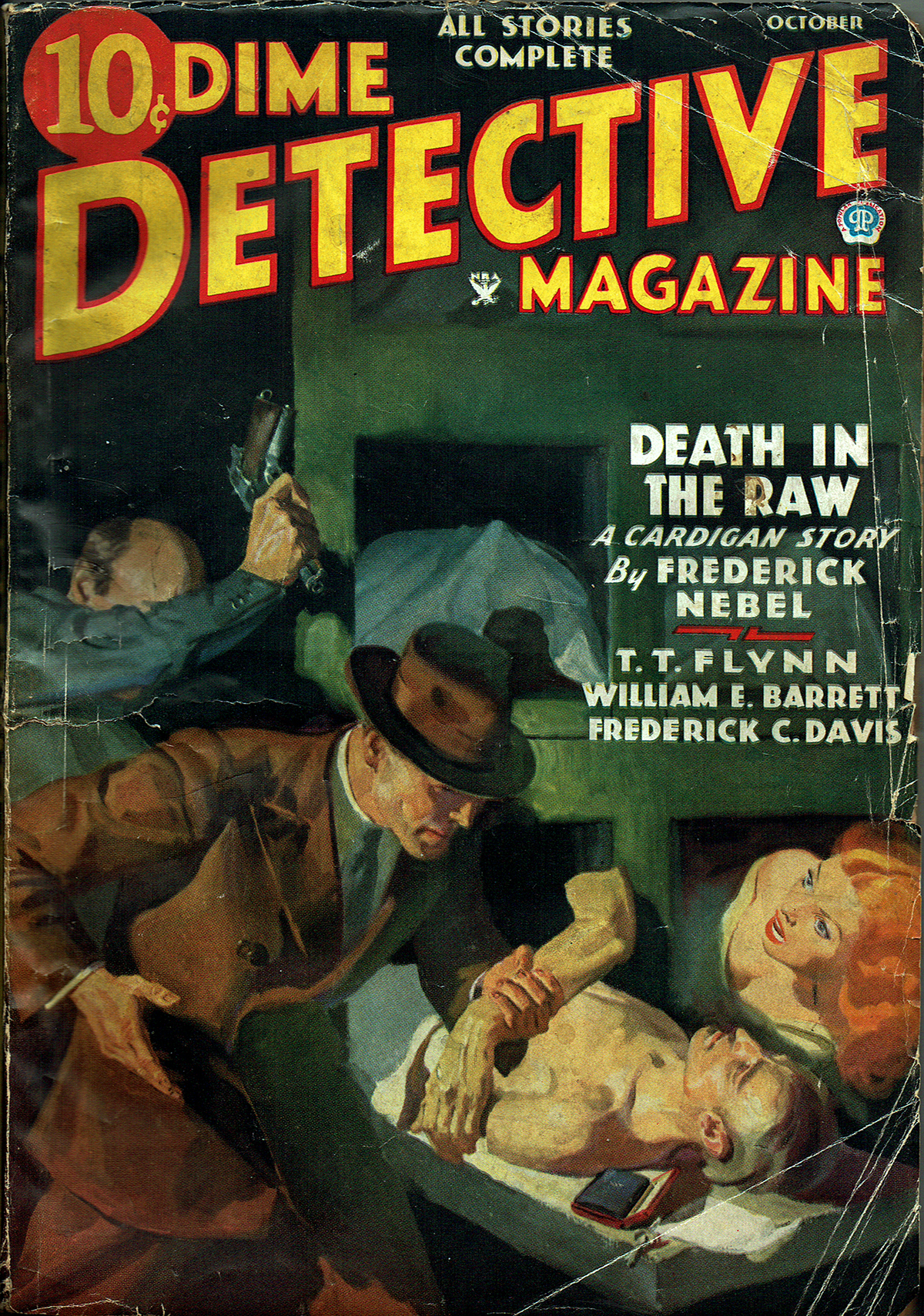

 the City of New York on November 16, 1900. It was snowing like blazes that day, if I remember rightly. Anyway, 1 managed to survive the hazards of Manhattan boyhood until I was sixteen, then, while the native New Yorkers of my age were pouring in from Kansas, Missouri and Minnesota, I followed the family star of destiny to Colorado. I had prepared at Manhattan College Prep in New York for an engineering career, but this proved to be a misdeal and I took a whirl at reporting for a Denver daily. I never progressed past the cub stage and was fervently advised by a harassed city ed. that I never would. After that I became one of the young men who signed the coupon.
the City of New York on November 16, 1900. It was snowing like blazes that day, if I remember rightly. Anyway, 1 managed to survive the hazards of Manhattan boyhood until I was sixteen, then, while the native New Yorkers of my age were pouring in from Kansas, Missouri and Minnesota, I followed the family star of destiny to Colorado. I had prepared at Manhattan College Prep in New York for an engineering career, but this proved to be a misdeal and I took a whirl at reporting for a Denver daily. I never progressed past the cub stage and was fervently advised by a harassed city ed. that I never would. After that I became one of the young men who signed the coupon. Great thinkers are not lions for courage—thought convinces them of the folly of risk. I am thinking of the men who brought the law to the wilderness in the first place (the same type who will bring it back when it strays). Most of them were men who sought escape from the law some place else— not sticklers for the fine points of the written law, but foursquare for a square deal and for the rights of human beings to live their lives and keep what they have. Derek Dane stands for that and, if he steps outside the statute book to get results, he has fundamental laws to justify him.
Great thinkers are not lions for courage—thought convinces them of the folly of risk. I am thinking of the men who brought the law to the wilderness in the first place (the same type who will bring it back when it strays). Most of them were men who sought escape from the law some place else— not sticklers for the fine points of the written law, but foursquare for a square deal and for the rights of human beings to live their lives and keep what they have. Derek Dane stands for that and, if he steps outside the statute book to get results, he has fundamental laws to justify him.

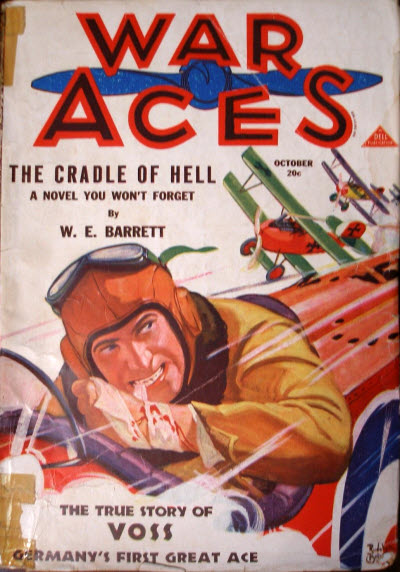 the month we have the story of Captain Jim Fogarty, a Montana Irishman in the service of Britain. He was Youth triumphant, a, veteran of six weeks on the fighting Front, commander of a squadron, and officially credited with victories over sixteen enemy airmen. The twin Ds of Death and Defeat had not touched him—but when it did, they brought him straight down into the cradle of hell and nearly cost him his life!
the month we have the story of Captain Jim Fogarty, a Montana Irishman in the service of Britain. He was Youth triumphant, a, veteran of six weeks on the fighting Front, commander of a squadron, and officially credited with victories over sixteen enemy airmen. The twin Ds of Death and Defeat had not touched him—but when it did, they brought him straight down into the cradle of hell and nearly cost him his life!

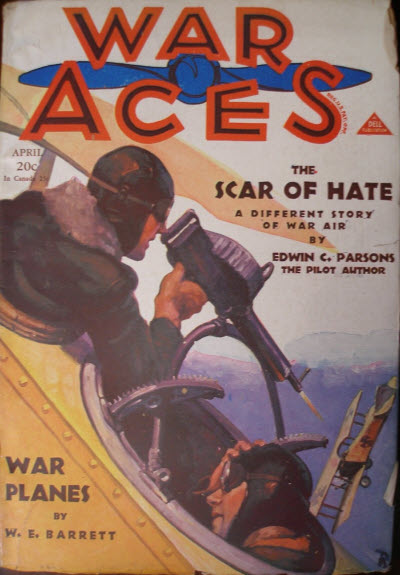 of Captain Frederick Dietterich who is being relieved of his temporary command as captain and squadron leader to serve under a Prussian, Hauptmann von Kopf. Dietterich was an Alsatian and that had been a handicap. The Imperial Government accepted great service from Alsatians but withheld its trust while accepting them. His reputation on the other side of the line had hurt, too. He had been known as a clean sportsman. H.Q. had frowned at that. It favored officers who were feared. The last touch was his popularity with his men. The men of his jagdstaffel spoke of him as “Fritz”. The Imperial command could not associate authority with familiarity and Dietterich was going back to the flying ranks.
of Captain Frederick Dietterich who is being relieved of his temporary command as captain and squadron leader to serve under a Prussian, Hauptmann von Kopf. Dietterich was an Alsatian and that had been a handicap. The Imperial Government accepted great service from Alsatians but withheld its trust while accepting them. His reputation on the other side of the line had hurt, too. He had been known as a clean sportsman. H.Q. had frowned at that. It favored officers who were feared. The last touch was his popularity with his men. The men of his jagdstaffel spoke of him as “Fritz”. The Imperial command could not associate authority with familiarity and Dietterich was going back to the flying ranks.

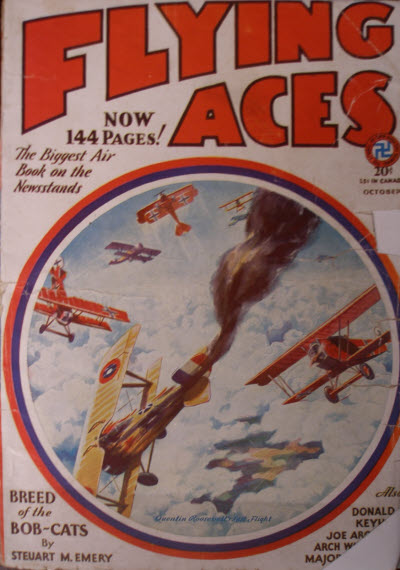 of Jack Kane, a pilot with the 17th Squadron’s C Flight who’s in over his head. Turns out C Flight plays hand after hand of poker in between patrols and young Kane has been doling out I.O.U.s to cover his debts and the time to settle up those debts is fast approaching. Problem is, he doesn’t have the money to cover those I.O.U.s. Kane believes it would be better to perish in battle and die a hero than face disgrace when his debts come due!
of Jack Kane, a pilot with the 17th Squadron’s C Flight who’s in over his head. Turns out C Flight plays hand after hand of poker in between patrols and young Kane has been doling out I.O.U.s to cover his debts and the time to settle up those debts is fast approaching. Problem is, he doesn’t have the money to cover those I.O.U.s. Kane believes it would be better to perish in battle and die a hero than face disgrace when his debts come due!